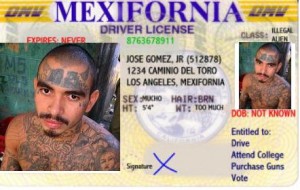California Holds Hearing to Iron Out Details of Illegal Alien Licenses
01/30/2014

On Tuesday, a hearing was held in Sacramento to figure out how to distribute driving permits to foreigners without suitable identification. Naturally, the program will be a fraud magnet for criminals and bums of all sorts, which could have been considered earlier.
Why didn’t the brainiac legislators sort through this difficult stuff during the bill write-up stage? It’s a little late to worry now about empowering foreign criminals.
The hearing sounds like it was quite the zoo, with dozens of Spanish speakers griping about their new benefit and how it wasn’t quite what they wanted.
Naturally they whined about the cost to them, even though the amount hasn’t been determined yet. One proposal is to add a surcharge of $100 to the regular $33 price for a license. Lots more money is needed, $65 million for the first year alone, since the DMV is planning on hiring additional staff and building extra facilities for the onslaught next year. For example, the state is building a new $9 million DMV for Fresno that will handle some of the newly legal drivers.
However, the detail of who pays was not decided by the legislature, so the taxpayers may be stuck with the bill.
Another complaint was the difference of the new card from regular state licenses, identifying the holder as a non-citizen. The law requires applicants to sign an affidavit that they are not eligible to get a Social Security number, so the card is an admission of being an illegal alien. The licenses could therefore be used at some later date for deportation — hey, we can dream.
Immigrant driver’s licenses prompt concerns about required documents, legal risk, Sacramento Bee, January 29, 2014
With California preparing to offer driver’s licenses to immigrants in the country illegally, the documentation needed to prove residency and the use of personal information emerged as key concerns at a Department of Motor Vehicles hearing on Tuesday.
Gov. Jerry Brown last year signed a bill creating special licenses for immigrants, capping years of effort by Democratic lawmakers and immigration advocates. Now the action moves from the Legislature to the DMV, which is under pressure to move quickly as it crafts regulations.
“In light of the urgent need for driver’s licenses, we respectfully request that you expedite the development of regulations and commence accepting applications for licenses as soon as possible,” read a Jan. 6 letter to the DMV signed by 24 members of the California Latino Legislative Caucus.
Dozens of people, many speaking in Spanish through interpreters, lined up on Tuesday to ask about how the process will play out.
The question of documentation was a dominant theme. Many speakers urged the DMV to accept a broad range of evidence establishing California residency, noting that many immigrants lack other forms of identification. Ideas included utility bills, baptismal certificates and union identification cards.
“You can put together where people live and that they’re part of a community by taking a flexible approach,” said Eric Vega, a professor at California State University, Sacramento, and a member of the Sacramento Immigration Alliance.
Countering that call for a broader approach was Shelia Byars, a DMV driver safety hearing officer who warned of seeing “fraud out of control” during her 18-year career.
“A utility bill, for me, does not establish residency,” Byars said. “If we’re looking at other ways of establishing identity,” she added, “then I think we need to go deeper than check-cashing cards and utility bills.”
As the Legislature debated creating the licenses last year, the legislation’s author for a time planned to shelve the legislation amid concerns that distinct markings on the IDs — federal law requires a feature distinguishing the cards from traditional licenses — would expose immigrants to discrimination and potential deportation.
Those worries surfaced again on Tuesday. A speaker from the Coalition for Humane Immigrant Rights of Los Angeles asked the DMV to reassure immigrants about how application information will be used, “so we won’t be full of fear.” Others wondered whether the licenses could be used to reveal someone’s immigration status in court.
“In a court of law or administrative process, that will create a stigma to the person judging them, whether a judge or a jury,” said Noe Paramo of the California Rural Legal Assistance Foundation.
Assembly Bill 60 requires applicants to sign an affidavit saying they are ineligible for a Social Security number and cannot prove lawful presence. While the legislation contains language prohibiting discrimination on the basis of the licenses and a DMV official noted on Tuesday that the affidavits will not be public documents, advocates remain wary.
“We’re very, very worried about this affidavit requirement because potentially it could have consequences in immigration proceedings — not only the affidavit but the license itself essentially becomes evidence the person is here unlawfully,” Ronald Coleman of the California Immigration Policy Center said ahead of the hearing.
The potential cost of the licenses also fueled concern among speakers, with many of them saying high fees would discourage working-class immigrants from obtaining the licenses.
“We also want to make sure that these driver’s licenses are accessible,” Coleman said. “We don’t want there to be overly burdensome fees to impede community members from getting these licenses.”
A Senate analysis found that offering the licenses could cost between $140 million and $220 million over three years, and Brown’s 2014-15 budget proposal seeks $64.7 million to accommodate an expected surge of interest with additional staff and temporary field offices.
